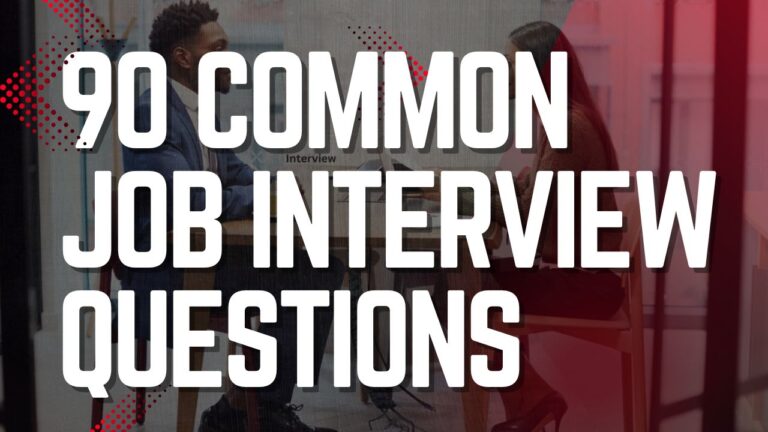200+ Amazon Interview Questions: Ace Your Hiring Process

Landing a job at Amazon is a goal for many due to the company’s status as a leading tech giant and its reputation for innovative culture. In this post, we will cover 200 expected Interview Questions at Amazon.
To secure a position, it’s crucial to understand the interview process which often includes a mix of technical questions, behavioral assessments, and discussions centered around the company’s leadership principles. Knowing what to expect and preparing effectively can significantly increase your chances of success.

Amazon interviews are known for their rigorous nature, requiring candidates to demonstrate problem-solving skills, a customer-centric mindset, and the ability to innovate.
You’ll be evaluated on how you approach complex situations and your compatibility with Amazon’s work ethos. Preparing for the interview means not just brushing up on your technical expertise but also being able to articulate your experiences in a manner that resonates with Amazon’s core values.
As you venture into the interview process, remember that your ability to navigate the interview questions effectively can make the difference between an offer and a rejection.

The company seeks candidates who are not only skilled but also aligned with their leadership principles and capable of thriving in their fast-paced environment. Equip yourself with a deep understanding of the role you’re applying for, and practice responding to common interview scenarios to approach your Amazon interview with confidence.
- General Questions for the Interview
- Background Questions
- Management Interview Questions
- Leadership Principles Interview Questions
- Interview Questions Related to Experience
- Technical and Skill based Questions Amazon Interview
- Interview Questions related to the Company
- List of Additional Sample Questions
General Questions for the Interview
When preparing for an Amazon interview, you should familiarize yourself with questions that probe your understanding of leadership and how you’ve tackled challenges in the workplace, as these align with Amazon’s leadership principles.
The following are common interview questions along with suggested answers, tailored to help you reflect on your experiences relative to the job description you’re applying for.
Q1: How do you handle a challenging situation at work? A: You should describe a specific challenging situation, outline the actions you took to address it, and detail the successful outcome.
Q2: Can you give an example of when you demonstrated leadership? A: Provide a concise story from your past work experience that illustrates your leadership skills, making sure it aligns with one or more of Amazon’s leadership principles.
Q3: Describe a time when you failed. What did you learn from it? A: Choose a situation where you faced failure and focus on the learning outcome and how it helped you grow professionally.
Q4: Tell me about a time when you had to make a decision with incomplete information. A: Explain the situation, your thought process, and how you reached a decision, emphasizing your analytical and risk-assessment skills.
Q5: How do you prioritize your tasks? A: Outline your method or system for prioritizing tasks, mentioning how it maintains balance between urgent and important tasks.
Q6: Give an example of when you went above and beyond for a customer. A: Reflect on a past experience showing your commitment to customer satisfaction, which demonstrates adherence to Amazon’s customer obsession principle.
Q7: Describe a time when you disagreed with a team member. How did you resolve it? A: Share a professional disagreement and focus on the resolution, showcasing your communication and conflict-resolution skills.
Q8: How do you assess the risk versus reward in making decisions? A: Discuss your approach to evaluating risks and rewards, making sure to highlight logical decision-making processes.
Q9: How do you keep yourself updated with the latest in your field? A: Talk about your methods for staying informed and how continuous learning is a part of your professional life.
Q10: Have you ever taken on a project that was not part of your job description? Why? A: Illustrate your willingness to take initiative and contribute beyond your defined role, explaining how it benefited the team or organization.
Background Questions

When preparing for an interview with Amazon, it’s crucial to anticipate the types of background questions you may encounter.
Here’s a concise list that encompasses a range of typical background questions along with insightful sample answers to each.
Q1: Describe your professional journey up to this point. A: I have spent the last five years working in tech, focusing on software development and project management, which has equipped me with the necessary skills for this role.
Q2: What motivated you to apply for a position at Amazon? A: I am inspired by Amazon’s innovation and customer-centric philosophy and I’m eager to contribute to a team that consistently pushes the boundaries in the tech industry.
Q3: Can you highlight your main responsibilities in your current job? A: As a senior developer, I lead a team of programmers and manage the full lifecycle of software development, from initial conception to deployment.
Q4: How does your previous experience prepare you for this role? A: My experience with cloud services and scalable systems has provided me with a strong foundation that is directly applicable to the projects I would be managing at Amazon.
Q5: What are your most significant professional achievements? A: Successfully leading the development and launch of a mobile application that secured over a million downloads in its first year is one of my proudest achievements.
Q6: Why are you leaving your current job? A: I am looking for an opportunity that presents greater challenges and growth prospects within a global and dynamic environment that Amazon offers.
Q7: Describe a project that was particularly challenging and how you handled it. A: In my current role, I encountered a project with tight deadlines and complex integration requirements. I prioritized tasks, optimized our workflow, and guided my team to deliver the project on time.
Q8: What is your approach to handling conflict in a team setting? A: I believe in open communication and proactive problem-solving, engaging team members to express their concerns and collaboratively finding a resolution.
Q9: How do you prioritize tasks when you have multiple deadlines? A: I assess the urgency and impact of each task, then allocate resources and adjust timelines accordingly to ensure that critical deadlines are met.
Q10: Can you discuss a time when you had to adapt to significant changes at work? A: When my company pivoted its business model, I quickly embraced the change, upskilled where necessary, and helped my team adapt to the new direction.
Management Interview Questions

Below is a curated list of potential Questions and Answers to aid in your preparation.
Q1: Provide an example of a time where you had to make a difficult managerial decision. A: You could mention a scenario where you had to choose between two strong candidates for a promotion or when you had to cut costs, which impacted staffing.
Q2: How do you motivate your team? A: Speak about specific strategies you use, like setting clear goals, offering positive reinforcement, and creating a collaborative work environment.
Q3: Describe a situation where you led a project that did not go as planned. A: You should discuss a time when an unexpected obstacle occurred and the steps you took to realign the project with its goals, such as adapting the plan or managing stakeholder expectations.
Q4: How do you handle underperforming employees? A: Explain your approach, including the assessment of their performance, providing constructive feedback, offering support/training, and following up on improvements.
Q5: Can you give an example of how you’ve built a successful team? A: Talk about a time when you assembled a team, focusing on how you identified individual strengths and encouraged diversity to achieve the best results.
Q6: What’s your method for prioritizing tasks within a team? A: Describe your process, possibly including tools you use for task management and how you delegate responsibilities based on urgency and importance.
Q7: How do you ensure your team meets deadlines? A: Detail strategies such as setting milestones, monitoring progress, and maintaining open communication to stay on track.
Q8: Describe your approach to managing remote teams. A: Discuss the use of technology for communication, setting clear expectations, and fostering a sense of community despite the distance.
Q9: How do you handle conflicts within your team? A: Provide an answer that showcases your conflict resolution skills like listening to all parties involved, identifying the root cause, and mediating towards a mutually acceptable solution.
Q10: Tell us about a time you had to implement a policy that was unpopular with your team. A: Recount a situation by explaining the necessity of the policy, the way you communicated it, and how you addressed the concerns of your team to ensure compliance.
Leadership Principles Interview Questions
Amazon’s interview process often includes questions based on its Leadership Principles. You’ll need to demonstrate how you embody these principles through behavior-based questions.
Prepare to showcase your abilities in leadership, ownership, trust, innovation, and customer obsession.
Q1: Tell me about a time you took a calculated risk. A: You might recount an instance where you made a decision with potential downsides, but through careful analysis, you mitigated risks and achieved a positive outcome.
Q2: Describe a situation where you had to earn someone’s trust. A: Share an example where your reliability, communication, and integrity helped you build trust with a team member or a client.
Q3: How have you exhibited ownership in your previous projects? A: Discuss a scenario where you went beyond your formal role, taking initiative to solve problems or improve outcomes.
Q4: Provide an example of when you innovated to solve a problem. A: Talk about a time you identified a unique opportunity for improvement and implemented a creative solution.
Q5: Explain how you have used customer feedback to drive improvement. A: Illustrate how you incorporated customer insights into product or service enhancements.
Q6: Can you give an example of when you disagreed with a decision and how you handled it? A: Explain a situation where you respectfully voiced a differing opinion and worked towards a constructive resolution.
Q7: Tell me about a time you helped develop someone’s career. A: Describe mentoring or coaching you provided that had a measurable impact on someone’s professional growth.
Q8: When did you have to make a decision with incomplete information? A: Outlines instances where you used judgment and available resources to make a timely decision despite uncertainties.
Q9: How do you ensure projects you lead are customer-focused? A: Provide an example that shows your commitment to prioritizing customer needs in your project management.
Q10: Describe a challenging team dynamic you’ve navigated. A: Reflect on a time you addressed conflict or performance issues to enhance team cohesion and productivity.
Q11: When have you had to sacrifice short-term results for long-term gain? A: Detail a scenario where a longer-term strategy was chosen over immediate benefits to achieve enduring success.
Q12: How have you demonstrated frugality in your decision-making? A: Share how you’ve achieved more with less or optimized resources to add value.
Q13: Tell me about a time when you had to deliver difficult feedback. A: Recall a situation where you provided constructive feedback that led to positive change or growth.
Q14: How do you handle the pressure of rapidly changing priorities? A: Share strategies you’ve employed to stay adaptable and maintain high performance in the face of change.
Q15: Provide an example where you identified a business opportunity others overlooked. A: Talk about your ability to spot trends or insights that prompted a successful new initiative.
Q16: Describe a time when you had to balance multiple stakeholders’ interests. A: Discuss a complex project where you navigated differing agendas to achieve a win-win situation.
Q17: Can you give an example of setting a bold direction for your team? A: Reflect on a moment when you established and communicated a visionary goal that motivated your team.
Q18: How have you maintained a high bar for excellence? A: Describe the standards and processes you’ve implemented to ensure exceptional quality in your work.
Q19: Tell me about a past project where you exemplified resourcefulness. A: Share a situation that highlights your ability to overcome obstacles with creative problem-solving.
Q20: How do you stay informed and ahead in your field to drive innovation? A: Discuss the ways you engage with the latest trends and incorporate cutting-edge ideas into your work.
Interview Questions Related to Experience

When preparing for an Amazon interview that focuses on experience, you’ll encounter questions aimed at understanding your past roles, challenges, successes, and career trajectory.
Q1: Can you describe a challenging project you managed and how you led it to success? A: I managed a project facing tight deadlines and budget constraints. I allocated tasks based on team competencies, streamlined communication, and we delivered the project on time, under budget, resulting in a 15% increase in client satisfaction.
Q2: Explain a time when you had to adapt to significant changes at work. A: After a major policy shift, I quickly revised our team’s strategy to align with the new goals. This adaptability minimized disruptions and maintained our team’s performance.
Q3: How do you handle meeting tight deadlines? A: I prioritize tasks based on urgency and impact, delegate effectively, and am willing to put in extra effort when necessary to ensure deadlines are met without compromising on quality.
Q4: Describe an instance where you had to make a difficult decision in your previous role. A: Faced with a high-stakes vendor selection, I conducted a thorough analysis and ultimately selected a provider that surpassed our needs and expectations, albeit at a higher initial cost.
Q5: Tell me about a time you led a team to achieve a difficult goal. A: I unified a team with diverse skills to work towards a critical product launch by setting clear expectations and milestones. Our collaborative effort led to a successful on-time launch.
Q6: Discuss a time when you set ambitious goals. How did you reach them? A: I set a goal to increase market share by 10% and achieved this by optimizing our marketing campaign, which resulted in surpassing the target within nine months.
Q7: How do you ensure your skills and knowledge stay up to date in your field? A: I engage in continuous learning through online courses, workshops, and staying abreast of industry trends to ensure my expertise remains relevant.
Q8: Describe a situation where you had to collaborate with a difficult colleague. A: I worked with a colleague who had differing views on a project. Through active listening and establishing common ground, we combined our approaches to enhance the project’s outcome.
Q9: Can you provide an example of how you’ve contributed to a team’s success? A: In my last role, I initiated a peer-review process that improved our team’s productivity by 20% and helped us exceed our quarterly objectives.
Q10: Share an instance where you had to use data to make a decision. A: I leveraged customer data analytics to tailor our sales strategy, resulting in a 25% increase in conversion rates.
Q11: Describe how you’ve dealt with failure in a work setting. A: After a product underperformed, I led a post-mortem analysis to identify improvements, applying these lessons to subsequent projects which then met their targets.
Q12: Explain your role in a successful team project. A: As a project manager, I orchestrated the collaboration of various departments, ensuring clear communication and that each milestone was met, culminating in the project’s success.
Q13: How do you prioritize tasks in a fast-paced environment? A: I evaluate tasks based on their impact and deadlines, addressing the most critical and time-sensitive first while maintaining flexibility for emergent issues.
Q14: Provide an example of when you had to learn a new technology for work. A: When our company adopted a new CRM system, I not only mastered it within two weeks but also facilitated training sessions for my colleagues.
Q15: Tell me about a risk you took in your career and the outcome. A: I transitioned from a technical role to a leadership position, which broadened my career path and led to a series of promotions and increased responsibilities.
Q16: Discuss a time when you exceeded expectations on a project. A: Tasked with improving a process, I not only optimized it but also automated several steps, which cut costs by 30% more than expected.
Q17: How do you handle feedback? A: I welcome feedback as a means for professional development, actively implementing advice to enhance my performance.
Q18: Can you give an example of how you managed a conflict within your team? A: I mediated a dispute by facilitating a constructive dialogue, which resolved the conflict and improved the team dynamic.
Q19: Explain your process for setting professional goals. A: I set SMART goals that are specific, measurable, achievable, relevant, and time-bound, with regular checkpoints for assessing progress.
Q20: Describe a professional accomplishment you’re proud of. A: I am proud of leading a product development that penetrated a new market segment, resulting in a 40% revenue increase for that product line.
Technical and Skill based Questions Amazon Interview

When interviewing for a role at Amazon, expect technical and skills-based questions that assess a wide array of your capabilities.
Questions will probe your proficiency in software development, your coding acumen, familiarity with databases, problem-solving skills, knowledge of necessary tools, system design understanding, and awareness of regulations pertinent to the role.
Interview Questions related to the Company
When preparing for an interview with Amazon, anticipate questions that dig into your knowledge about the company’s culture, history, and ethics.
These questions are an opportunity to showcase your understanding of the Amazon way.
Q1: Can you tell us about Amazon’s leadership principles? A: Amazon has 14 leadership principles that guide employee decisions and actions, including “Customer Obsession,” “Invent and Simplify,” and “Learn and Be Curious.” Familiarizing yourself with these principles can demonstrate your alignment with the company’s values.
Q2: How does customer service play a role in Amazon’s success? A: Customer service is critical at Amazon. The company aims to be the Earth’s most customer-centric company, whereby customer feedback directly influences service improvement and innovation.
Q3: What do you know about Amazon’s work culture? A: Amazon fosters a culture of innovation, ownership, and customer-centricity, encouraging employees to embrace challenges and take calculated risks.
Q4: How do you see Amazon’s ethical policies relating to your role? A: Amazon’s ethical policies are centered on integrity and fairness, which apply to all aspects of business, from customer interactions to dealing with vendors and competitors.
Q5: What was a significant turning point in Amazon’s history? A: A significant turning point was the launch of Amazon Web Services (AWS), which transformed not only Amazon but the global computing landscape.
Q6: How does Amazon’s commitment to operational excellence affect an employee’s daily routine? A: Employees are expected to continuously improve processes, enhance customer satisfaction, and eliminate inefficiencies, being attentive to detail and proactive in solving problems.
Q7: Who is Jeff Bezos, and what impact did he have on Amazon? A: Jeff Bezos is the founder of Amazon. His vision and innovative strategies, such as the “Day One” philosophy, were key in shaping Amazon’s dynamic and forward-thinking culture.
Q8: What do you think Amazon looks for in an employee? A: Amazon looks for individuals who are customer-obsessed, innovative, and able to work in a fast-paced environment, embodying the leadership principles.
Q9: How would you align with Amazon’s focus on sustainability in your day-to-day work? A: I would prioritize efficient resource use, advocate for eco-friendly practices, and ensure that sustainability is considered in decision-making processes.
Q10: Can you describe a challenge Amazon faces in the marketplace and how it might overcome it? A: Competition in the e-commerce space is a significant challenge. Staying ahead through innovation, strategic partnerships, and continuing to scale the Amazon ecosystem are vital to overcoming this challenge.
List of Additional Sample Questions

- How would you handle a situation where a team member is not meeting their performance targets?
- Can you provide an example of a time when you had to manage a project with tight deadlines and limited resources?
- What do you know about Amazon’s leadership principles and how do you embody them in your work?
- How do you stay updated with the latest industry trends and technologies relevant to your role?
- Describe a time when you had to resolve a conflict within a team.
- How do you prioritize tasks when faced with multiple deadlines?
- Give an example of a successful project you managed from start to finish.
- What strategies do you use to ensure effective communication within a team?
- How do you handle feedback and criticism from your peers or supervisors?
- Can you provide an example of a time when you had to make a difficult decision at work?
- How do you approach problem-solving in a high-pressure environment?
- Describe a time when you had to adapt to a significant change in your work environment.
- How do you ensure that your work aligns with the overall goals and objectives of the company?
- Can you give an example of a time when you had to influence others to support your ideas or initiatives?
- How do you handle competing priorities and shifting deadlines?
- Describe a time when you had to lead a team through a challenging project or situation.
- How do you measure the success of a project or initiative?
- Can you provide an example of a time when you had to innovate or introduce a new process to improve efficiency?
- How do you approach building and maintaining relationships with key stakeholders?
- Describe a time when you had to quickly learn and adapt to a new technology or system.
- What steps do you take to ensure the quality of your work in a fast-paced environment?
- How do you handle ambiguity and uncertainty in your role?
- Can you provide an example of a time when you had to deal with a difficult customer or client?
- How do you ensure that your work is aligned with customer needs and expectations?
- Describe a time when you had to collaborate with cross-functional teams to achieve a common goal.
- How do you stay motivated and engaged in your work, especially during challenging times?
- Can you give an example of a time when you had to take initiative to solve a problem or address an opportunity?
- How do you approach decision-making when faced with limited information or conflicting data?
- Can you provide an example of a time when you had to lead a change management initiative within your team or organization?
- Describe a time when you had to handle a difficult situation with a customer or client and how you resolved it.
- How do you ensure that your work is compliant with relevant regulations and standards?
- Can you give an example of a time when you had to manage a project with a diverse team with different skill sets and backgrounds?
- Describe a time when you had to present complex information or data to a non-technical audience.
- How do you approach risk management in your projects or initiatives?
- Can you provide an example of a time when you had to negotiate with vendors or external partners to achieve a favorable outcome for your organization?
- Describe a time when you had to handle a crisis or unexpected challenge at work.
- How do you ensure that your team members feel valued and motivated in their roles?
- Can you give an example of a time when you had to coach or mentor a colleague to help them improve their performance?
- Describe a time when you had to make a difficult ethical decision at work.
- How do you ensure that your team’s work is aligned with the company’s overall strategy and vision?
- Can you provide an example of a time when you had to manage conflicting priorities within your team or organization?
- Describe a time when you had to manage a project with a limited budget and resources.
- How do you approach performance management and evaluation of your team members?
- Can you give an example of a time when you had to lead a team through a major organizational change or restructuring?
- Describe a time when you had to resolve a conflict between team members and how you handled it.
- How do you ensure that your team’s work is aligned with customer feedback and market trends?
- Can you provide an example of a time when you had to advocate for a new idea or initiative within your organization?
- Describe a time when you had to manage a project with competing stakeholder interests and how you navigated the situation.
- How do you approach continuous improvement and innovation in your work and projects?
- Can you give an example of a time when you had to manage a project with a geographically dispersed team?
- How do you ensure diversity and inclusion in your team’s work and interactions?
- Can you provide an example of a time when you had to manage a project with rapidly changing requirements and priorities?
- Describe a time when you had to handle a difficult performance review or disciplinary action with a team member.
- How do you ensure that your team’s work aligns with sustainability and environmental goals?
- Can you give an example of a time when you had to manage a project with a remote or virtual team?
- Describe a time when you had to resolve a technical issue or challenge within a project.
- How do you ensure that your team’s work aligns with data privacy and security requirements?
- Can you provide an example of a time when you had to manage a project with a high level of complexity and uncertainty?
- Describe a time when you had to manage a project with a significant cultural or language barrier.
- How do you ensure that your team’s work aligns with regulatory and compliance standards in different regions or markets?
- Can you give an example of a time when you had to manage a project with conflicting legal or contractual obligations?
- Describe a time when you had to handle a crisis or emergency situation within your team or organization.
- How do you ensure that your team’s work aligns with the principles of corporate social responsibility?
- Can you provide an example of a time when you had to manage a project with a high level of public scrutiny or media attention?
- Describe a time when you had to manage a project with a significant impact on public health or safety.
- How do you ensure that your team’s work aligns with industry best practices and standards?
- Can you give an example of a time when you had to manage a project with a high level of political or regulatory risk?
- Describe a time when you had to handle a difficult situation with a government agency or regulatory body.
- How do you ensure that your team’s work aligns with international trade and import/export regulations?
- Can you provide an example of a time when you had to manage a project with a high level of geopolitical risk or instability?
- Describe a time when you had to manage a project with a significant impact on global supply chains.
- Can you provide an example of a time when you had to manage a project with significant cybersecurity considerations?
- Describe a time when you had to handle a difficult situation involving intellectual property rights or patent issues.
- How do you ensure that your team’s work aligns with anti-corruption and anti-bribery regulations?
- Can you give an example of a time when you had to manage a project with a high level of economic or financial risk?
- Describe a time when you had to manage a project with a significant impact on global economic markets.
- How do you ensure that your team’s work aligns with import/export compliance and trade regulations?
- Can you provide an example of a time when you had to manage a project with a high level of environmental sustainability considerations?
- Describe a time when you had to handle a difficult situation involving product safety or quality assurance.
- How do you ensure that your team’s work aligns with industry-specific regulations and standards, such as healthcare or financial services?
- Can you give an example of a time when you had to manage a project with a high level of regulatory compliance requirements?
- Describe a time when you had to manage a project with a significant impact on public policy or government relations.
- How do you ensure that your team’s work aligns with industry-specific ethical guidelines and codes of conduct?
- Can you provide an example of a time when you had to manage a project with a high level of public relations or reputational risk?
- Describe a time when you had to handle a difficult situation involving crisis communication or brand management.
- How do you ensure that your team’s work aligns with global trade and tariff regulations?
- Can you give an example of a time when you had to manage a project with a high level of regulatory reporting and disclosure requirements?
- Describe a time when you had to manage a project with a significant impact on international trade agreements or trade policy.
- How do you ensure that your team’s work aligns with industry-specific health and safety regulations?
- Can you provide an example of a time when you had to manage a project with a high level of product compliance and certification requirements?
- Describe a time when you had to handle a difficult situation involving workplace safety or occupational health issues.
- How do you ensure that your team’s work aligns with industry standards?
- Can you describe a situation where you identified a safety hazard in the workplace and took appropriate action to address it?
- How do you prioritize safety in your daily work activities?
- Can you provide an example of a time when you had to follow safety protocols and procedures in a high-risk environment?
- How do you ensure that your team members are aware of and adhere to safety guidelines and regulations?
- Describe a time when you had to respond to an emergency situation and ensure the safety of yourself and others.
- How do you stay updated with the latest safety regulations and best practices relevant to your role?
- Can you give an example of a time when you had to report a safety concern to management and advocate for corrective actions?
- Describe a time when you had to conduct a safety audit or inspection in the workplace.
- How do you promote a culture of safety and risk awareness within your team or organization?
- Can you provide an example of a time when you had to address a safety violation or non-compliance issue?
- Describe a time when you had to develop or improve safety protocols and procedures within your work environment.
- How do you ensure that your work processes and equipment meet safety standards and regulations?
- Can you give an example of a time when you had to train or educate others on safety practices and protocols?
- Describe a time when you had to investigate a safety incident or near-miss and implement preventive measures.
- How do you handle safety concerns raised by your colleagues or team members?
- Can you provide an example of a time when you had to collaborate with safety professionals or regulatory agencies to address safety issues?
- Describe a time when you had to lead a safety improvement initiative within your team or organization.
- How do you ensure that safety is integrated into project planning and execution?
- Can you give an example of a time when you had to address ergonomic or physical safety concerns in the workplace?
- Describe a time when you had to communicate safety-related information to a diverse group of stakeholders.
- How do you motivate and inspire your team to achieve their best performance?
- Can you provide an example of a time when you had to resolve a conflict between team members and how you approached it?
- How do you prioritize tasks and manage your time effectively as a manager?
- Describe a time when you had to give constructive feedback to a team member and how you ensured it was well-received and acted upon.
- Can you give an example of a time when you had to adapt your management style to accommodate the needs of a diverse team?
- How do you ensure open and effective communication within your team and across different departments?
- Describe a time when you had to lead a team through a significant change or transition, and how you managed the process.
- Can you provide an example of a time when you had to delegate tasks and responsibilities effectively to achieve a common goal?
Please note that these are sample questions and not an exhaustive list, so it is essential to prepare broadly for a variety of topics when interviewing with Amazon or any other company.






